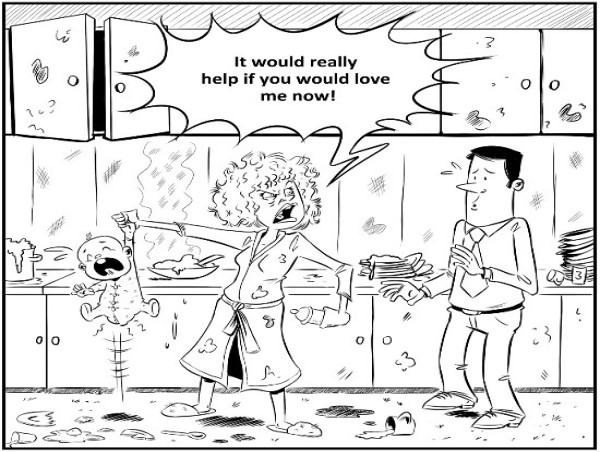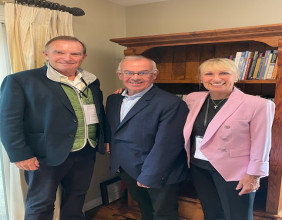Cartoons and aphorisms that give insight into problems with low self-esteem and interpersonal conflicts using a large dose of humor.
SAINT LOUIS, MISSOURI, UNITED STATES, August 23, 2023/EINPresswire.com/ -- Arthur Hartz, PhD, MD has long been disguised as a nerdy professional medical researcher. Now, he’s revealed himself a dashing anthropologist determined to rescue a primitive society from an epidemic of PTED. PTED of course refers to Post Traumatic Ego Disorder, a severe condition caused by lack of respect that has reached epidemic proportion in this society. The inhabitants have learned that no matter where they are or what they are doing, their egos are never safe.Hartz describes PTED in a series of cartoon books entitled The Slings and Arrows of Mundane Fortune. Three examples from his book are below:
The bottom line of Hartz’s research is that the evil bastards don’t cause most problems. More often it’s a human nature terribly designed for interpersonal relationships and a culture that exaggerates the worst features of this nature.
Readers will appreciate that the social commentary in these books comes in small doses without preaching or offering simplistic solutions. Instead, it exposes the absurd (and from a distance funny) ways that people self-destruct or destroy others for no reason.
Because Hartz has the artistic ability of an “arthritic elephant,” he has recruited three outstanding cartoonists to draw the cartoons: Aleksandar Jovic from Serbia, Paddy Wolfe from Salt Lake City, Utah, and Heroud Ramos from Peru. The team of Hartz and the cartoonists work to distill complex ideas into simple, recognizable, and funny vignettes.
Each book in The Slings and Arrows of Mundane Fortune series describes PTED in a different context. The four books currently available are described below:
• Love and Marriage; Cartoons about Imperfect People Managing Their Most Important Relationships A person’s happiness and fulfilment depend more than anything else on the quality of his or her most intimate relationships. It's a great loss when the quality of the relationships are undercut by selfishness, insensitivity, poor communication, and unjustified lack of trust. The ideal partner is a great lover — not in the commonly used sense of a great seducer with great sexual sophistication — but in the sense of one with a great ability to love, fully appreciate, care for, and support another person. That ability is rarer and more important to the happiness of both the lover and the loved. The cartoons in this book show where the relationships go wrong but do so with gentleness and a lot of humor.
• Winners and Losers: Heretical Cartoons About the American Religion of Winning The winners are those admired for their success, brilliance, beauty, talent, or charm. They are valued, their faults tolerated, and their kindness exaggerated. The large number of people who want their companionship is a burden. Losers are everyone else. They struggle for appreciation and companionship, and their mistakes are viewed without sympathy. In the American culture, winners are good, and losers are bad. This book presents a series of insightful and humorous cartoons and aphorisms that question whether the American creed ¬– “winning is the only thing” – makes for a better society.
• Our Autumn Years; Not Golden but Interesting. Hartz draws on his medical background and personal experiences to show that the elderly are more interesting than the annoying cardboard representations of decline they are imagined to be. There is as much variation, complexity, novelty, relatability, humor, and nobility in the way that the elderly cope with their daily challenges and relationships as there is for younger people. Their confrontation of the most important problems of their lives with the fewest resources of their lives is heroic. They deserve attention and respect, not disgust and pity.
• Friendship: How Hard Could That Be. Everyone wants friends and the only requirement (theoretically at least) is to be a friend, i.e., like and be liked. How great a contract is that? How can it possibly it go wrong? Pretty simple R.E.S.P.E.C.T. It has to be earned, and it’s not easy, particularly if it’s from the type of person with greater social success that is natural to like. In the ideal world, respect would be automatically given and then lost with bad behavior. That’s not even close to the world created by human genes and human culture. The cartoons and aphorisms in this book show with insight and humor the reasons that respect is difficult to achieve and the consequences of when it isn’t.
More about the creative team and examples of their cartoons is presented on the website, https://arthurhartz.com/ . The books can be purchased on Amazon using this link, https://rb.gy/o4t2l .
Arthur Hartz
Amazon KDP
[email protected]
Visit us on social media:
Facebook
LinkedIn
Other




